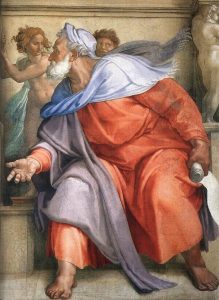Archive, Articles
Let the Wildness In
This essay was published in the October 2024 issue of The Catholic Herald as part of a series inviting contributors to present a favourite book from Holy Scripture.
In these times of consultations and questionnaires, we are constantly asked to reflect on our responses to things. Our basic mode of understanding is self-referential. Such epistemology, if that is the right word, is inculcated by authorities established to form patterns of public perception. A seasoned primary-school teacher told me of a formation seminar she recently attended. A scenario was proposed: You take a group of kids on a walk in the woods. One comes along with a pinecone asking, ‘Miss, what’s this?’ What do you say? The instruction was clear: No facts; indeed, no reply. Instead, an enquiring look and the question: ‘My dear, what is it to you?’
I was chewing on this story when I visited, shortly afterwards, Norway’s new National Museum. The collection enchanted me but I became exasperated when I began to read the notices displayed, hoping to learn something about the paintings’ provenance or style. For I found the texts to be largely appeals to my imagination. ’What do you think moved the artist to paint this still life?’ ‘What sense does the model’s twisted arm suggest?’ Instead of taking me out of myself, the curators held up a mirror, making me consider my own uninteresting visage in these works of great art. I felt pandered to in a humiliating way. I had only to stop reading the notices, of course. But the joy of the visit had somehow been spoiled.
We need voices that call out to us, ‘Look up!’, alerting us to the strangeness and wonder of things, teaching us to learn, to pay attention. We need Ezekiel.
The book of Ezekiel begins in ‘the fifth year of the exile of King Jehoiachin’ (1.2), so in 593 BC. Jerusalem is routed. Israel, whose identity had been shaped by the Exodus narrative of a journey home, is scattered once more, translated to Babylon, despairing of the thought of ever singing glad songs again (Psalm 137.4).
There the Lord finds them. His first message is neither of comfort nor of rebuke. He does not bid Israel analyse its predicament. Instead, he shows the nation, through the prophet, himself. Through wonderful, strange imagery engaging all our faculties, Ezekiel prepares us to grasp the ontological difference of divine being.
The decadence into which the people had fallen, the effective cause, if you will, of its fragmentation and exile, was the effect of confessional compromise. Israel had lost the ability to reckon with who God is. For that reason he led them away, into a far country, to reveal himself to them again.
Ezekiel provokes, still, a revolution of perspective. Our intelligence is pressed. Our senses are elevated as we get a glimpse of what it might mean to contemplate God’s glory, the carrying theme of his prophecy. We are told from the start that not even the choicest human gift is equal to it. After all Ezekiel had seen, he could say no more than that he had perceived ‘the appearance of the likeness of the glory of the Lord’ in response to which he fell upon his face in adoration (1.28).
This singular book exhorts us to adopt this interior posture. Only thereby, we are told, will we judge wisely in the things of this world, awake to their meaning. Ezekiel maintains a sublime outlook yet is the most concrete of prophets. He becomes prophecy, performing weird gestures, enduring terrible solitude, having to consume and interiorise a word that burns him in order to proclaim it to a people ‘of a hard forehead and a stubborn heart’ (3.7). Reading him, we learn that our motivation and nature must be purified before we can receive a mystery of jubilant grace. Then, illumined by God’s light, the frightfulness of godless practice, which formerly we took for granted, will be self-evident, enabling a cordial repentance that, for piercing us, is sweet, therefore productive.
In Marilynne Robinson’s novel Lila, the eponymous heroine, whose past had been anything but devout, decides to learn Scripture by reading Ezekiel. John Ames, her gentle pastor husband, worries that she will be put off by the book’s difficult parables and violent language. Lila, however, is undeterred. Ezekiel’s starkness of vision corresponds to her experience of life. She remarks that ‘she never expected to find so many things she already knew about written down in a book.’
Ezekiel recalls her to the ‘wildness of things’. The motif recurs later in the book, when Ames shares the story of how a strange bird once flew into the vicarage.
He’d never seen one like it. The wind must have carried it in from some far-off place. He opened all the doors and windows, but it was so desperate to escape that for a while it couldn’t find a way out. ‘It left a blessing in the house’, he said. ‘The wildness of it. Bringing the wind inside.’
Do we not need, now, more of that wind in our communities to restore our sense of God’s greatness and to blow away our bureaucratic, self-absorbed tediousness? Do like Lila Ames. Read Ezekiel. Bring the wildness and its blessing inside.

Michelangelo’s Ezekiel, from the Sistine Chapel.
